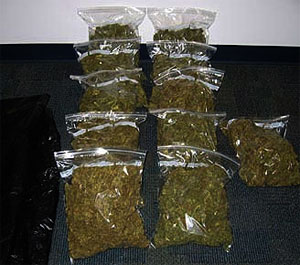The United Nations Office on Drugs and Crime (UNODC) has revealed that Cannabis was the most widely used substance in Nigeria in 2017.
Mr William Wu, UNODC’s Representative, said in Lagos on Wednesday that this was according to a report on a survey conducted by UNODC on “Drug Use in Nigeria 2018’’.
Wu spoke at a one-day conference organised by the Alcohol and Drug Addiction Referral Services in collaboration with Echoes of Mercy and Hope Foundation Outreach in Lagos.
The News Agency of Nigeria (NAN) reports that the conference was in commemoration of the International Day against Drug Abuse and Illicit Trafficking marked annually on June 26.
According to the study, the high use of cannabis was followed by pharmaceutical opioids mainly tramadol, and to a lesser extent, codeine.
Quoting the study, Wu said: “In 2017, 10.6 million Nigerians used Cannabis; 4.6 million used opioids; 2.4 million used cough syrup inappropriately as drugs; 481,000 people used tranquelisers and sedatives.
“Also, 34,000 Nigerians used ecstasy; 3000 Nigerians used solvents and inhalants; 238,000 used amphetamines and perspective stimulants, while 92,000 Nigerians used cocaine in 2017.
“Proportionally, more men than women have used drugs in Nigeria in 2017.
“ One in four drug users in Nigeria is a woman, while men are seven times more likely than women to use cannabis.
“The gender difference is in the non-medical usage of pharmaceutical opioids– such as tramadol, codeine and morphine, tranquilizers and cough syrups containing codeine or dextromethorphan is less pronounced.
“ Men are also more likely than women to be high risk drug users, including those who inject drugs.’’

The UNODC representative called for the establishment of a drug observatory that could regularly collate data and analyse the drug situation in the country.
“There is need for a mechanism such as the establishment of a drug observatory, which can regularly collate data and analyse the drug situation in the country to further inform policy and programme development.
“The drug observatory could regularly monitor, through established indicators of drug use and supply, the emerging new drug threats and the implementation of regular drug use surveys in the general population and among youth.
“It will also monitor the analysis of patterns of drug use among vulnerable population groups, and the monitoring of the extent and quality of responses to address the drug situation in the country,’’ Wu said.
In his comments, Mr Dele Balogun, representing Dr Tony Rapu, Chairman, Board of Trustees, Freedom Foundation, called for more concerted approach to tackle the menace.
“The use of drug is strikingly high and more concerted approach needs to be deployed to tackle it.
“For this to be, it is imperative to build partnership to combat drug abuse directly from the root causes.
“Addiction is a disease that must be treated only with the help of God,’’ he said.
Also an addiction Psychiatrist, Dr Jumoke Koyejo of the Federal Neuro-Psychiatric Hospital, Yaba, urged people not to criminalise a drug addict.
According to her, addiction is a chronic disease, a long term, relapsing and reccurring disease of the brain.
“Once we see addiction that way, we would not criminalise it; our patients will seek treatment and the community would get better.
“When a child goes outside and gets bitten by mosquito, and he or she comes down with malaria, that is a disease.
“The same way with a person who uses a substance and that becomes a disease on them, because it has affected their brain functioning.
“What they need is to get treated and not criminalised; they should not be seen as one terrible person somewhere,’’ she said.
In her remarks, Mrs Oyetola Adetola, a Consultant on Drug and Alcohol Control, urged parents to always monitor their children’s behaviour and performances for possible signs of drug addiction.
“Some of the signs to look out for are: when the performance of your child is not getting better in the school that is, for somebody who was doing very well and suddenly begins to decline.
“A child who grow moody, would not talk to anybody, always wanting to be alone in his room and probably changes friends.
“Look out also for a child who is always putting on perfume every 24 hours because he may be covering up the smell of a drug as well as dark glasses to cover up the white part of the eye that has turn red.
“Do not also fail to look out for syringes anywhere in the house,’’ she advised. (NAN)

